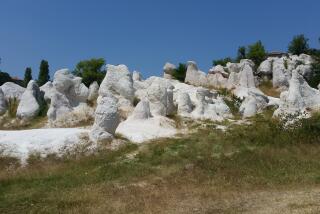Book Review : Creating a Dickinson Out of Shadows
- Share via
Emily Dickinson by Cynthia Griffin Wolff (Knopf: $25)
How do you write a definitive biography of a subject whose every conscious act seemed designed to thwart any such attempt, whose daily existence was virtually devoid of external event, whose letters and personal papers were destroyed a century ago, leaving only scraps so elliptical they seem written in code?
Emily Dickinson’s poetry was kept in a locked box throughout her lifetime, obviating any contemporary reaction. She left home no more than a dozen times, eventually withdrawing to her bedroom, an austere chamber furnished with only the barest essentials. Impossible, you’d say, even if Dickinson were living next door. More impossible still if she died with every secret still intact.
If you’re Cynthia Griffin Wolff, you’d not only rise to the challenge but relish it. “Indeed,” Wolff admits, “it would be difficult to cite an American author of commensurate power whose life offers less in the way of striking occurrence.”
But after warning the reader not to expect titillating revelations or unsuspected drama, she proceeds to deliver a 600-page study; a complete Dickinson by indirection, creating a background so detailed, an inner life so expertly developed that the invisible poet becomes a vital presence. We never miss the actual Dickinson because we have this amazing creation. Next to the personality Wolff has devised, the “real” Dickenson would be the shadow, this one the substance.
An Elusive Persona
Griffin’s first step is to establish an elaborate context crowded with the ideas, influences and associations that formed Dickinson’s elusive persona. Fortunately, other members of the Dickinson clan were neither as reticent nor as shy. Though “flamboyant” might seem a curious adjective for these 19th-Century New England Puritans, there can’t have been many citizens of Amherst, then a village of 3,000, whose lives offer more scope for speculation.
Surrounded by her father’s obsessions, her brother’s passions, her sister’s enthusiasms and trials, Dickinson may well have decided that she could only survive as a writer by removing herself as far as possible from the turmoil. With the exception of Emily, the Dickinsons could have furnished material for a miniseries complete with enough extramarital intrigue, financial crises, devastating illnesses, public conflicts and private estrangements to keep viewers sprawled on their sofas for a month.
Tracing the origins of this family, Wolff begins with Dickenson’s grandfather, the founder of Amherst College; characterizing the Dickinson men as a “microcosm of the American experience as it sprang from the Puritan roots of New England,” and by extension, finding in her verse the inevitable outcome of that tradition, “the vision of the Kingdom of God on Earth that had been summoned in Winthrop’s invocation of “a city upon a hill.”
Amherst was the epitome of one such “city,” at the very center of the religious revivalism sweeping New England during the mid-19th Century. Dickenson would encounter that fervor again at the age of 18, when she attended Mount Holyoke Seminary during 1847.
Independent Religious Thinker
Resisting the pressures of family and teachers, she remained an independent religious thinker, unable to relinquish her private vision of a demanding Old Testament Jehovah for the sweet forgiving God of the Amherst Trinitarians. Though eventually she would abandon orthodox observance entirely, Dickenson’s poetry was profoundly God-ridden, the imagery traceable to its biblical origins, the central theme the inscrutable ways of God to man.
Despite the emotional remoteness of her often absent father, the inaccessibility of her invalid mother and the busy lives of her brother and sister, Dickinson’s attachment to her family was so intense that she never seriously considered marrying and leaving that small circle. Though there is evidence from the cryptic remains of her archly affectionate letters to Samuel Bowles and the more passionate declarations to Otis Phillips Lord that she was at least half in love with Bowles and entirely so with Lord, she was unable to tear herself away from the family home, even after Lord’s wife died and he was free to marry.
“I rejoice that I love him . . . the exaltation floods me,” she wrote in one of her surviving letters, but any direct action to consummate the relationship seemed unthinkable. “Don’t you know you are happiest while I withhold and not confer--don’t you know that No is the wildest word we consign to language?” Lord died unexpectedly in 1884 when Emily was 47. The paper romance had lasted for 21 years.
Literary Correspondence
In addition to those who shaped Dickinson’s supremely private emotional life, Wolff pays particular attention to the literary figures who formed her intellectual and spiritual attitudes; Thomas Wentworth Higginson, with whom she regularly corresponded, Samuel Bowles, the vigorous and influential editor of the Springfield Republican with whom she had a more personal connection, and Josiah Holland, a Springfield colleague of Bowles’ who left the state to become the first editor of Scribner’s Monthly.
Allusions in Dickinson’s poetry suggest she was familiar with the works of Hawthorne, Melville, Poe and Dickens; well-acquainted with Shakespeare, Donne and other English giants.
All this is setting. Character emerges from meticulous textual analysis of the poems themselves. In her close examination of the verses, well-known and obscure, Wolff discovers recurrent motifs appearing from the earliest ventures to the most mature works. Among them are Dickinson’s difficulty in reconciling a benevolent God with the actuality of earthly evil and misery; her self-imposed loneliness and isolation; her overriding consciousness of the precariousness of life in the ever-present midst of death. Though these interpretations have been explored before, Wolff builds original bridges, working not ony from poem to poem but from the writer’s mind to the written word.
Wolff’s Emily Dickinson is neither wraith nor belle, but an ambitious and innovative writer far closer to the center of American life and letters than previously supposed.


